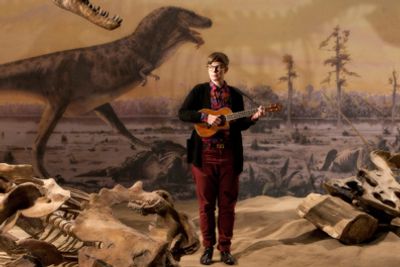By Hans Pedersen, January 2016 Web Exclusive.
At one point in the musical documentary My Prairie Home Canadian folk singer Rae Spoon makes the brilliant remark that “gender is stupid.”
Even without knowing the context, the more you think about it, the more Spoon’s frank observation about how society constructs gender may ring true.
The singer, whose prefers the gender-neutral pronoun they/them/their, along with My Prairie Home director Chelsea McMullan, spoke with Echo Magazine last year at the 2015 Sundance Film Festival.
Looking back, Spoon said, life has become easier overall since coming out as trans.
“I think for me, personally, it has gotten a lot better,” Spoon said. “I came out 13 years ago ... it’s been a long 13 years. So yeah, it’s definitely changed in the time that I was trans.”
“Yeah that was the goal of the film, I think,” McMullan said. “I sort of wanted to create a biography of a feeling, like a biography of what it’s like to be Rae. That was very important to me.”
As a result, McMullan both captures and recreates moments in Spoon's life for what turned out to be part-biography and part musical documentary.
Both McMullan and Spoon admit that this project kept them busy. McMullan shot the doc while Spoon was touring, which in some cases meant shooting on Greyhound buses with a small Panasonic camera.
“We had to be pretty covert …We really tried to make the film cinematic but with limited means,” McMullan said, recalling one gorgeous music video sequence involving a deer for which she used a Red camera.
“A touring schedule, as a musician, is very full,” Spoon pointed out. “So we were plugging in interviews and staged in music sequences in between …”
And according to McMullan, being on the road was insane.
“I felt like I was flying by the seat of my pants because I’d never seen a documentary musical," McMullan chimed in. "It’s hard to find references … I was sort of making up the language of the film as I was going along.”
With unique moments, including the charismatic singer performing for a bunch of truckers on the road, is inspired filmmaking.
At one point in the film, Spoon (who grew up as a Pentacostal, but now identifies as atheist) performs at a Unitarian Church.
“I really wanted to do a show … at a supportive church,” Spoon recalled, “because I thought it would be really interesting to read from my book about being Pentacostal.”
McMullan succeeds in giving audiences a little glimpse of what it’s like to be Spoon, who was socialized as a female growing up in Alberta, including their experience with trans acceptance from city to city across the U.S. and Canada.
“It definitely varies between the communities," they said. "Seattle had its first trans pride last June, and I played at that. So there are these trans prides popping up, [but] there still aren’t a lot of rights for trans people in their jobs or protection in the same way there is for sexual orientation ... So that has a long way to go, pretty much everywhere …”
As far as finding supportive legislation to help make life easier for the trans community, Spoon believes awareness is growing.
“I think hopefully the legislation would follow, to let people change their sex on their passport if they want," they said. "I would personally like to have no gender or sex on my identification."
And does Spoon feel that the gay and lesbian community embraces trans and non-conforming people?
“There are a lot of lesbian and gay people who are trans," they said. "That’s definitely where you see the conflict rising. Does the lesbian community accept transgender lesbians? Does the gay community accept transgender gay people?”
Pointing out how gender and sexuality are distinct, they said there’s still “a ways to go.” And yet, there’s a reason we’re known as the LGBT community.
“There are definitely people within the lesbian gay community who have definitely been champions of the trans community and allies, so I wouldn’t want to generalize too much,” they explained.
